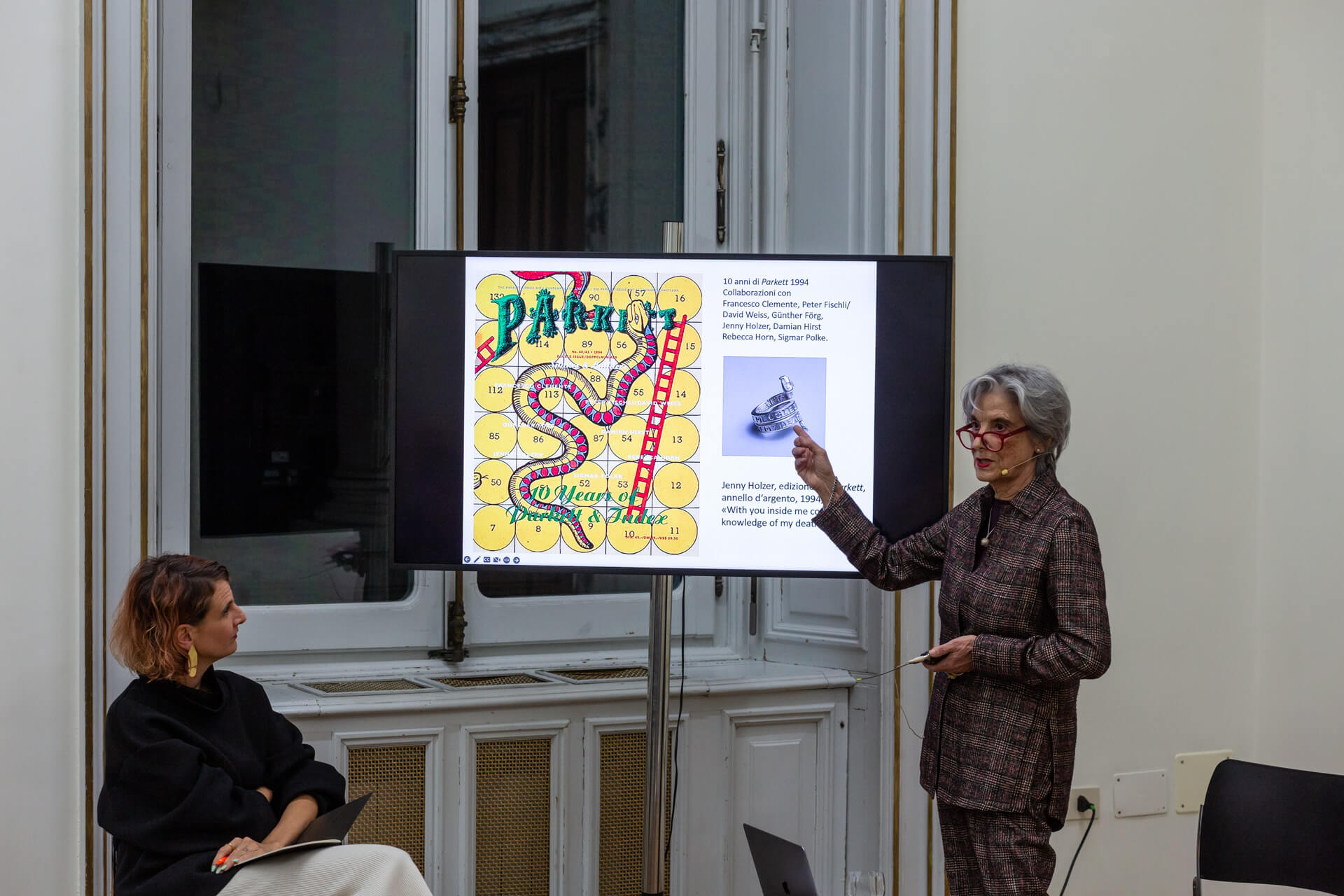Jacqueline Burckhardt
H18:30
Entrance: via Ludovisi 48
H18:30
Entrance: via Ludovisi 48
The talk will be held in Italian at Istituto Svizzero, via Ludovisi 48, Rome.
Free entry, registration recommended, click here.
An aperitivo will follow.
An evening with two themes:
Italy’s influence on Jacqueline Burckhardt’s professional life and a lecture ‘O like Oppenheim’
Istituto Svizzero is pleased to host a talk by art historian and curator Jacqueline Burckhardt within the context of the exhibition L’arcobaleno riposa sulla strada. On the occasion of the event, Jacqueline Burckhardt will speak about Meret Oppenheim, her connection to Italy, and her latest publication, La mia commedia dell’arte (Edition Patrick Frey).
«Art is my oxygen. It is also an inexhaustible horn of plenty, across the ages and disciplines». Jacqueline Burckhardt approaches art from many different angles: as a former restorer of artworks, as an art historian, as the initiator of the performance art program at the Kunsthaus Zürich, as a co-editor of the art magazine Parkett, as a curator of site-specific art on the Novartis Campus in Basel, as a lecturer at the Accademia di Architettura in Mendrisio, and as the director of the Sommerakademie residency program at the Zentrum Paul Klee in Berne. She has also been involved in cultural policymaking, having served as the president of the Swiss Federal Art Commission for nine years.
La mia commedia dell’arte gives an overview of Jacqueline Burckhardt’s work over the last 50 years, within this work and life Meret Oppenheim also plays an extremely important role in this life and work: Jacqueline was friends with the artist, she wrote about her and curated exhibitions.
Running through her book is an extended meandering conversation be-tween Jacqueline Burckhardt and curator/art historian Juri Steiner, which reveals her ‘inter esse’, her being in between and in the thick of the field of art. As effortless as it appears, the conversation is nonetheless profound and attractively illustrated, evolving into a fascinating account of Burckhardt’s thought and work. Like rhizomes, the subject matter branches out into her many areas of endeavor. It touches on the twofold historicity of works of art, which must be taken into account in art restoration in particular, and which is so masterfully and playfully handled by Giulio Romano, the ‘stage director of an antiquity brought back to life’, on whom she wrote her dissertation back in the day. The interlocutors consider Herbert Lachmayer’s concept of aesthetic intelligence’ and the metaphysical nature of a work of art. They introduce us to Kairos, the Greek god of the opportune moment, as well as to Renaissance patroness of the arts Isabella d’Este, a botfly and an octopus. Jacqueline Burckhardt has been writing about contemporary art for forty years now. The selected writings included in this book tie into some of the topics broached in the conversation and provide a representative cross-section of her essays.
Five textual and visual inserts by Laurie Anderson, Kurt W. Forster, Katharina Fritsch, Herbert Lachmayer and Pipilotti Rist give us a sense of her ties to these artists and authors.
Jacqueline Burckhardt trained as an art restorer at the Istituto Centrale del Restauro in Rome, and earned her doctorate in art history at the University of Zürich. Since 1984 she is co-founder and editor of the art magazine Parkett, a magazine published in direct collaboration with international artists, whose oeuvre is explored in several essays by leading writers and critics. From1998-2006 she was the president of the National Committee of the Arts in Switzerland. Since 2004-2008 she was lecturing as a guest professor at the Accademia di Architettura in Mendrisio. Since 2006 she has served as an art consultant and curator for site-specific art works on the Novartis Campus in Basel. Since 2008, Burckhardt is the director of the Summer Academy at Zentrum Paul Klee in Bern.

Talk with Jacqueline Burckhardt at Istituto Svizzero, Rome, 2022. Photo © Davide Palmieri
Talk with Jacqueline Burckhardt at Istituto Svizzero, Rome, 2022. Photo © Davide Palmieri
Talk with Jacqueline Burckhardt at Istituto Svizzero, Rome, 2022. Photo © Davide Palmieri
Jacqueline Burckhardt and Meret Oppenheim restoring in their family house in Carona, 1981. Photo: Flavia Vogel
Jacqueline Burckhardt, 'La mia commedia dell'arte' © Edition Patrick Frey